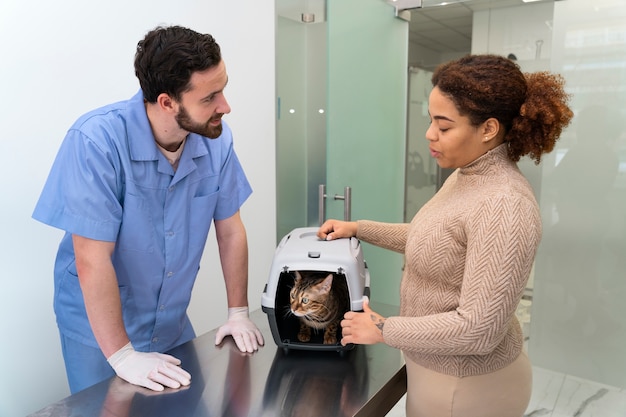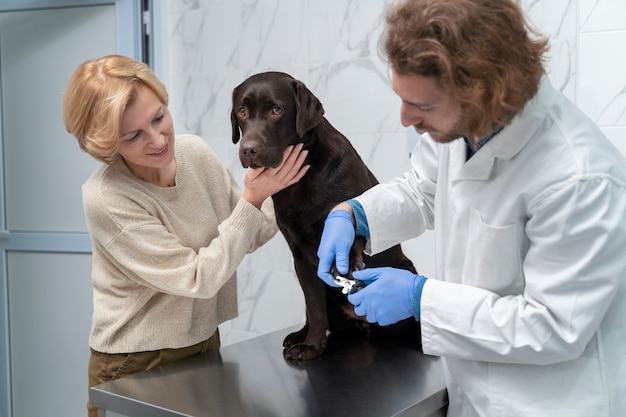Understanding Immunotherapy for Pet Cancer: Advanced Options Explained


Understanding Immunotherapy for Pet Cancer: Advanced Options Explained
When a beloved pet is diagnosed with cancer, many families in Coral Springs and surrounding communities are eager to explore every avenue for hope, healing, and comfort. With advances in veterinary medicine, treatment for pet cancer has moved beyond traditional options. Today, immunotherapy for pet cancer offers a powerful and innovative approach, helping your pet’s own immune system recognize and combat cancer cells. At Veterinary Cancer Health, located at 4101 Turtle Creek Drive, Coral Springs, FL, our team of veterinary oncologists is dedicated to offering the latest cancer therapies, including cutting-edge immunotherapy and targeted therapy for dogs and cats.
This blog will guide you through what immunotherapy for pet cancer is, which pets may benefit, how it works alongside other advanced treatments, and what to expect if you are searching for an oncology vet near me. We will also touch on how location-specific services like immunotherapy in Coral Springs can make a difference for your pet’s quality of life. If you are considering advanced cancer treatment options or looking for a specialist vet near me, Veterinary Cancer Health provides comprehensive cancer diagnostics, ongoing care, and compassionate support for every stage of your pet’s journey. You can also explore more about our immunotherapy options for pets on our website.
Recognizing the Signs: When Might Immunotherapy Be Needed for Your Pet?
Cancer in pets can be a subtle and complex disease. Identifying when your dog or cat might benefit from immunotherapy often begins with noticing persistent or unusual symptoms. Key signs that warrant a visit to a specialty veterinary oncology clinic include the appearance of lumps or bumps that do not resolve, unexplained weight loss, changes in appetite or behavior, persistent lameness, ongoing vomiting or diarrhea, and wounds that do not heal. Additionally, if your pet has already been diagnosed with cancer and you are seeking the most advanced options available, immunotherapy may be recommended as a stand-alone treatment or in combination with other therapies.
Owners looking for immunotherapy in Coral Springs or searching for an oncology vet near me often do so when conventional treatments such as surgery or chemotherapy alone have not provided the desired results, or when their pet’s cancer type is known to respond well to immune-based therapies. Veterinary oncology specialists can help determine whether your pet is a candidate for immunotherapy by conducting a thorough evaluation, which may include advanced diagnostic imaging and molecular testing.
Cancer in Pets: Understanding the Underlying Causes and the Role of the Immune System
Cancer arises when normal cells mutate and begin to grow uncontrollably, eventually forming tumors that can invade surrounding tissues or spread throughout the body. In both dogs and cats, cancer can develop due to genetic factors, environmental exposures, chronic inflammation, or simply as a result of aging. Certain breeds are more predisposed to specific cancers, and in South Florida’s climate, exposure to environmental factors like sunlight and pesticides may also play a role.
The immune system is naturally tasked with identifying and eliminating abnormal cells. However, cancer cells can disguise themselves, evade detection, or suppress the immune response. This is where immunotherapy for pet cancer steps in, aiming to empower your pet’s own immune system to better recognize and attack cancerous cells. Understanding how the disease develops provides context for why immunotherapy and targeted therapy for dogs and cats are such promising advancements. By leveraging the body’s own defenses, these treatments offer new hope for improving both survival and quality of life.
If you are interested in learning more about the underlying biology of your pet’s cancer, Veterinary Cancer Health offers DNA sequencing and molecular analysis to better personalize treatment plans and identify which pets are most likely to benefit from immunotherapy or other advanced modalities.
Exploring Advanced Cancer Treatments: Immunotherapy and Targeted Therapy for Dogs and Cats
Immunotherapy for pet cancer represents a major advancement in veterinary oncology, harnessing the immune system’s natural power to fight cancer. This approach can involve several techniques, each with unique benefits and applications. One common method is cancer vaccines, which are designed to boost the immune response against specific tumor antigens. Another approach involves monoclonal antibodies, which can bind to cancer cells and mark them for destruction by the immune system. Some immunotherapies work by removing brakes or “checkpoints” that cancer cells use to hide from immune attacks.
In addition to immunotherapy, targeted therapy for dogs and cats is gaining ground as a way to attack cancer cells more precisely while minimizing harm to healthy tissues. Targeted therapies may block the growth signals that drive tumor progression, interfere with blood supply to tumors, or disrupt specific genetic mutations found through molecular diagnostics. These therapies can be used alone or in conjunction with immunotherapy, surgery, or traditional chemotherapy, depending on your pet’s diagnosis and overall health.
At Veterinary Cancer Health, we tailor each treatment plan to your pet’s unique needs. Our veterinary oncology team uses the latest research and technologies to determine if immunotherapy, targeted therapy, or a combination is most appropriate. To further explore how targeted therapies can benefit your pet, visit our page on targeted therapy for dogs and cats.
Ongoing monitoring is essential during and after treatment. Through regular recheck exams and advanced imaging, we closely track your pet’s response and make adjustments as needed. Our focus is always on optimizing both quality and quantity of life with compassionate, advanced care.
Supporting Your Pet at Home: Steps to Take Alongside Professional Treatment
While professional cancer therapies form the cornerstone of effective treatment, pet owners play a vital role in supporting their pet’s well-being at home. After starting immunotherapy for pet cancer, your veterinary oncology team will provide personalized guidance on home care. Steps include monitoring your pet’s appetite and energy level, administering any prescribed medications as directed, and keeping a journal of symptoms or side effects. It is important to ensure your pet has a quiet, comfortable place to rest, along with regular access to fresh water and nutritious food.
Exercise should be tailored to your pet’s abilities and current health status, as some pets benefit from gentle walks or interactive play. Keeping up with scheduled appointments for recheck exams and bloodwork is critical for tracking progress and managing any side effects early. Emotional support and affection from family members can also make a meaningful difference in your pet’s outlook and comfort.
For those seeking immunotherapy in Coral Springs or targeted therapy for dogs and cats near me, Veterinary Cancer Health is dedicated to providing detailed education and ongoing support every step of the way. If you are interested in continuous care, learn about our ongoing cancer care and monitoring services to help your pet thrive during treatment.
When to Seek Veterinary Oncology Care: Finding a Specialist Vet Near Me
If you notice persistent or worsening symptoms in your pet, or if your general veterinarian has diagnosed cancer and you are exploring specialized treatment options, it is important to seek the expertise of a veterinary oncology specialist. Immediate consultation is recommended if your pet experiences sudden changes such as rapid swelling of a mass, difficulty breathing, unexplained bleeding, acute pain, or collapse. These can indicate aggressive cancer progression or complications that require urgent attention.
Many pet owners find themselves searching online for an “oncology vet near me” or “specialist veterinarian near me” when faced with complex cancer diagnoses. At Veterinary Cancer Health, we work closely with your primary care veterinarian to provide seamless referral-based care, ensuring your pet receives the most advanced diagnostics and therapies available. Our team of veterinary oncologists in Coral Springs uses state-of-the-art technology to deliver tailored, evidence-based treatment for every patient.
Timely intervention can make a significant difference in outcomes, particularly when considering advanced options like immunotherapy for pet cancer or targeted therapy for dogs and cats. If you are unsure whether your pet would benefit from a specialty consultation, we also offer second opinions and case reviews to help guide your decision-making process and provide reassurance during a difficult time.
Conclusion: Leading the Way in Immunotherapy for Pet Cancer in Coral Springs
Facing a cancer diagnosis in your beloved companion can feel overwhelming, but you do not have to navigate this journey alone. The team of veterinary oncologists at Veterinary Cancer Health, located at 4101 Turtle Creek Drive, Coral Springs, FL, is committed to providing compassionate, advanced care through every phase of your pet’s treatment. With expertise in immunotherapy for pet cancer and targeted therapy for dogs and cats, we offer hope and tailored solutions for families seeking immunotherapy in Coral Springs or those looking for an oncology vet near me.
If you are ready to explore your pet’s treatment options or need specialized guidance, we invite you to reach out to our veterinary oncology professionals. Learn more on our immunotherapy for pets page, or call (954) 592-8504 to schedule a consultation. Let us help you find the best path forward, combining advanced medicine and genuine compassion for your pet. Your pet’s health and comfort are always our highest priority, and we are honored to be the specialist vet near me you can trust for cancer care in Coral Springs and beyond.
This blog is for informational purposes only and should not replace professional veterinary advice. Always consult with your veterinarian or a veterinary oncologist for personalized recommendations and care.

.png)















